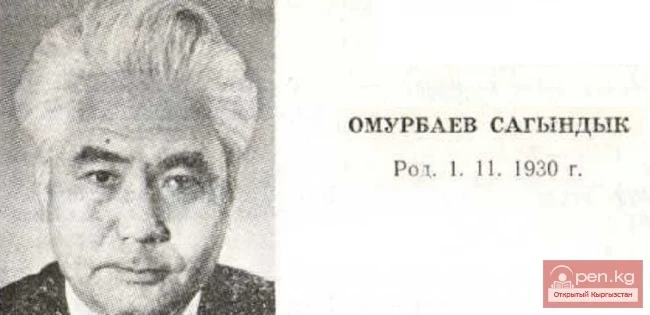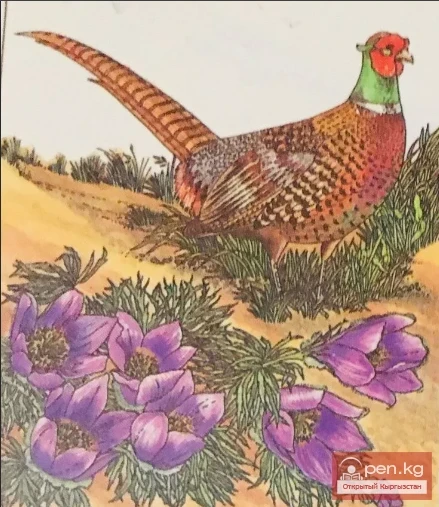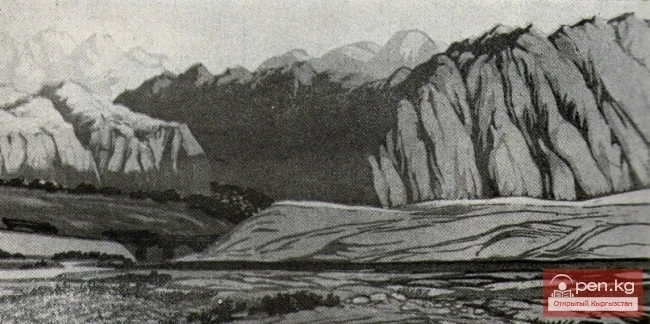Locusts, like a black cloud, covered the sky — how a peasant's daughter returned from China to Kochkor and raised 75-kilogram sheep
As part of the "Taryh insany" ("Person in History") project, we will tell you about Telegey Alambetovna Sagymbaeva, a Hero of Socialist Labor and an outstanding figure in collective farm construction.
Telegey was born on June 8, 1902, in the village of Akjar, located in the Kochkor district of Naryn region, in a family of simple peasants. Her childhood was filled with constant relocations, yet she always longed to return to her homeland.
In her memoirs, she shared: "Do not say how we hated this barren rocky land, but also do not forget how, finding ourselves far from it, we yearned and cried. In one of the drought years, locusts covered our land like a black cloud, and the sun disappeared from our sight.
This locust swarm devoured all the grass, leaving even the thorny plants lifeless. As a result, we, as a whole village, decided to set off on a journey. My father drove the sheep of a local wealthy man into foreign lands, and we followed him, making our way through narrow gorges and over passes. On the way, a snowstorm began, and we found ourselves under a blanket of snow. The horsemen galloped ahead, while we, barely moving, walked on foot, sinking into the snow. When I lost my strength, my father carried me in his arms.
Eventually, we found ourselves on a scorched steppe, herding someone else's livestock. My mother and I gathered dry branches for a fire. In the evenings, sitting by the fire, we mourned for our native land. My father often said: 'If it weren't for the debts, I would take you back.' I remained silent, understanding that even there it would not be easier for us. He comforted me: 'Do you think the land is bad? No, my daughter, it is not to blame for our poverty. If you work hard, the land will reward your labor.' Thus, she recalled the years of 1916 spent in China.
Telegey recounted that upon hearing about the overthrow of the tsar in Russia [Emperor Nicholas II was overthrown in February 1917], they decided to return to their homeland – to Alatoo. With the arrival of spring, when the passes opened, they set off on their journey. On foot, with supplies on their backs and staffs in hand, they crossed the icy passes. Many remained in a foreign steppe, unable to overcome the hardships.
At the top of the pass, Telegey's father, Alambet, passed away. His body was covered with stones at the foot of a cliff. A few days later, as they descended, her mother also died. Telegey, sitting beside her, cried, but despite the biting cold and the snowstorm, she gathered her last strength and continued onward.
Exhausted, she told her companions: 'Leave me, go without me.' But her fellow villagers did not abandon her and carried her to their homeland.
Upon returning to Kyrgyzstan, Telegey married Duyshonaly [Düyшөнаалы] Sagymbaev, and they started a family.
In 1927, when the first sheep-breeding farm "Kochkor" was established in the Tian Shan mountains, Telegey and her husband became among the first workers of this enterprise. Duyshonaly became the first Kyrgyz mechanizer in the Kochkor valley and operated a tractor.
In those years, when the state farm was being created, the sheep had coarse wool, suitable only for felt. When the "Kochkor" state farm received breeding sheep, Telegey was only 26 years old. Thanks to the work of scientists led by Academician M.N. Lushchikhin, and shepherds like Telegey, the Kyrgyz fine-wool ram was bred, whose wool was highly valued.
Kyrgyzstan was then famous for its fine-wool sheep, ranking third in the USSR.
The flock owned by Telegey produced enough wool to make five thousand suits. She worked tirelessly, raising children and achieving outstanding results.
Telegey became one of the first Kyrgyz women who boldly took on hard work, which was considered a male domain. Enduring harsh winter snowstorms and heavy spring rains, she did not retreat and continued to pave the way to success.
Contemporaries noted that thanks to her diligence and passion for her profession, she significantly contributed to the development of sheep breeding. Without knowing rest, she shared her experience with young shepherds, mentoring and assisting them in their work.
From each sheep she raised, she managed to shear 6 kg of wool, and the following year this figure increased to 7.2 kg. The live weight of the sheep reached 75 kg, and such animals she passed on to the state.
According to reference books, 1957 was a landmark year for Telegey Sagymbaeva. For her achievements, she was awarded the honorary title of "Hero of Socialist Labor."
In addition, she received the title of "Master of Socialist Animal Husbandry of the Kyrgyz SSR" and was elected as a deputy of the Supreme Council of the Kyrgyz SSR for the 4th, 5th, and 6th convocations.
Telegey was awarded the Order of Lenin and the gold medal "Sickle and Hammer."
She was not only a Hero of Labor but also a Heroine Mother, having raised many children. Her heart was filled not only with hard work but also with maternal love.
One hand held the whip, while the other cradled the cradle where her ten children grew.
Telegey, being a distinguished shepherd and a pensioner of union significance, passed away in 1980.
Read also:
Project "Zheneke": Aynazik Tangatarov got married after the first date, and later, out of embarrassment, she hid the dough from her mother-in-law.
The Turmush publication continues to share materials as part of the "Жеңеке" project,...
In At-Bashy, the 100th anniversary of two people's artists was celebrated
In At-Bashy, a solemn event was held to commemorate the centenary of the People's Artists of...
The first day on the job and immediately a rescue operation for a kidnapped girl — the story of police captain Asel Sulaymankulova
Turmush continues to introduce readers to the work and life of law enforcement officers in...
In the city of Naryn, cultural workers were awarded
A solemn event dedicated to the Day of Culture Workers of Kyrgyzstan took place in Naryn....
The Fate of the Chekist from the NKVD: M. Maksutov Was Left an Orphan, Learned Russian and Ukrainian, Captured Two Notorious Basmachis, and Personally Met with Stalin
In the framework of the "Taryh Insany" column, we will get acquainted with the life of...
Life in the Regions: Rakhiza Moldokulova – the Daughter of a Wealthy Kazakh Who Fled China Under the Cover of Night and Married a Kyrgyz Man
Rakhiza Moldokulova, originally from China, spent her early years there, studying in school until...
In the Ak-Talinsky District, the Day of Remembrance of History and Ancestors was celebrated
In the Ak-Tal district of the Naryn region, a Day of Remembrance for History and Ancestors was...
Twins: Janara and Anara, with a 15-minute age difference, often found themselves in adventures
In our "Twins" section, we present to you the story of Zhanara and Anar Tolekovs. These...
Beauties in Epaulettes: Ainura Kutmanova Explained Why She Chose the Police and What the Case of the "Lost" Letter Taught Her
Turmush continues to share stories about current and former law enforcement officers of the...
The Aydar Choybekov Family Won the District Competition "Best Family": His Story
Aidar Choybekov, along with his wife and children, became the winner of the district competition...
Life in the Regions: Former Volleyball Player from the Village of Asylbash Aiköl Bakirova Decided to Play Kok-Boru at 14
Ayköl Bakirova from the village of Asylbash, Sokuluk district of Chui region, has been passionate...
A program for the development of high-altitude and border territories is being developed
In Kyrgyzstan, a meeting of the working group preparing the State Program for the Development of...
In the village of Kok-Zhar in the Kochkor district, a new kindergarten is being built
In Kok-Jar, located in the Kochkor district of the Naryn region, the construction of a new...
In Kyrgyzstan, more than 6,500 scientists have been counted
In Kyrgyzstan, the scientific potential of the country includes 82 scientific and...
Unusual Names: Colonel Itikeev is Particularly Respected Among the Residents of an Entire District Due to His Name
Colonel Itikeev and his unusual name, which has become a symbol of respect in the Leilek district....
In the Moscow District, a family-type home for disabled individuals received a refrigerator and a cheese-making machine.
In the village of Ak-Suu, located in the Moscow district of the Chui region, a refrigerator and...
A conference dedicated to historical figures and the heritage of ancestors was held in the Kochkor district.
In the Kochkor district, a republican scientific and practical conference was held dedicated to the...
Unusual Names: A Resident of At-Bashy Was Named After a River in Russia and a Successful Woman
The new heroine in our "Unusual Names" section is Aleiy Mongoldorova, residing in the...

Prose Writer Sagyndyk Omurbaev
Prose writer S. Omurbaev was born in the village of Ak-Kuduk in the Kochkor district of the Naryn...
Are you experiencing power outages, and how often? Reader survey
Recently, residents of Bishkek and other regions of Kyrgyzstan have been increasingly facing power...
Our People Abroad: Aliya Sharsheeva from Karakol, working for one of the world's major airlines, shared a shocking incident that occurred on board a plane.
Turmush continues to share stories of Kyrgyzstani people working abroad. Today we will tell you...

Father in a Bag
Father in a Bag A father lived with his son and daughter-in-law. His wife had died, and he was...
Life in the Regions: Arslan Zhantaev from Suusamyr has a son of the famous "Frenchman," a grandson of the renowned "Sharpei," and a direct descendant of "Blondin."
Regional Life: Arslan Zhantaev from Suusamyr is a descendant of famous rams and a breeder of the...
"Zhubaylar": The Stepanov Family from Kant Celebrated Their 30th Wedding Anniversary by Participating in the "Three Generations" Contest
In the "Jubailar" section, we introduce readers to Venera and Andrey Stepanov, residents...
Lieutenant Nurgul Abdykerimova: On Working as an Investigator, Sports, and Poetry
Turmush continues to share stories about law enforcement officers in Kyrgyzstan, both current and...
The Story of One Family: Kuban Duyshembiev from Kochkor Proposed to a Girl from Naryn a Week After Meeting
Kuban Duyushembiev, a resident of the Kemin district in the Chui region, became the winner of the...
Life in the Regions: In Sokuluk, 15-year-old ulakchy Kenenbaeva was entrusted with a horse worth 10 thousand dollars
Shoola Kenenbaeva, 15 years old, lives in the village of Tosh-Bulak (Төш-Булак), located in the...
An exhibition dedicated to the history of growing medicinal poppy has opened at Issyk-Kul
On November 9, in Karakol, at the local history museum, an international exhibition titled...
In the Kochkor District, the 150th anniversary of Osmonaly Sydyk uulu was celebrated with a scientific conference
A scientific conference dedicated to the 150th anniversary of Osmonaly Sydyk uulu was held in the...
My Kyrgyzstan. Mar Baidzhiev
Mar Baidzhiev - a deputy of the legendary parliament, a distinguished cultural figure, a renowned...
Project "Zheneke": The Love Story of the Residents of the Issyk-Ata District, Marat Kozhomuratov and Lyra Motosheva, Who Celebrated Their 35th Wedding Anniversary
The Turmush publication continues its series of stories titled "Жеңеке" (Zheneke),...
Kyrgyzstan, together with partners, launches a project to support mountain regions
A recent meeting held by the special representative of the President of Kyrgyzstan for the...

The title translates to "The Tale 'Who is Stronger?'"
WHO IS STRONGER? Once upon a time, a colorful Pheasant was running about his business when he...

Regional development funds allocated over 900 million soms to support projects
In Kyrgyzstan, Regional Development Funds actively support socio-economic initiatives aimed at...
Beauties in Epaulettes: A Police Lieutenant Reveals How She Arrived at the Crime Scene as Part of the Investigation Team and Was Horrified
Turmush continues to introduce readers to the stories of current and former employees of the...
First Snow in Chui Region: Thick Fog and Frosts Down to 12 Degrees Below Zero
Snow with a thickness of about 10 centimeters has fallen in the village of Chorgulu, located at the...
"Our People Abroad": Altynbek Kurmanaliev's Perspective on Laws, Driving Culture, and Street Cleanliness in Slovakia
In the "Our People Abroad" section, we will tell you about Altynbek Kurmanaliev, who...
Life in the Regions: K. Zhoroeva from the city of Kara-Kul prepares complex Kyrgyz dishes that not every housewife has mastered
Kenjekyz Joroeva continues to delight her family and neighbors with traditional Kyrgyz dishes,...
In the Kochkor District, the 25th anniversary of the Batken events was celebrated
Recently, a commemorative evening was held in the Kochkor district, dedicated to the 25th...
Project "Zheneke": How Aizharqyn Timurlanova Learned to Be a Daughter-in-Law — From a Soup Joke to a Touching Moment in the Maternity Hospital
The regional news outlet Turmush continues the series "Жеңеке," where we share stories of...

Masters of the Older Generation
The senior generation masters L. Truskowski, N. Efremenko, A. Mikhalev, and I. Belevich...
Driving on the Bishkek - Karakol road is dangerous due to stones that are not visible under the snow.
On the road connecting Bishkek and Karakol, stones have accumulated, hidden under the snow cover,...
"Our People Abroad": The Turkish Groom Gave a "Bride Price" of $57,000 for ErkeAym Esengeldi Kyzy
In the new issue of the "Our People Abroad" column, we will tell you about 25-year-old...

Population of Kyrgyzstan as of January 1, 2013
Population of Kyrgyzstan Thanks to the fundamental changes that occurred in Kyrgyzstan after the...